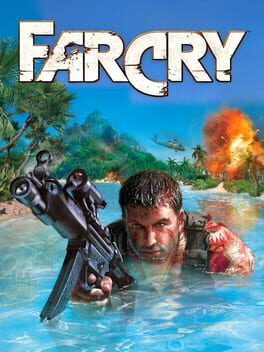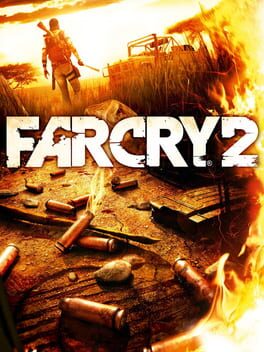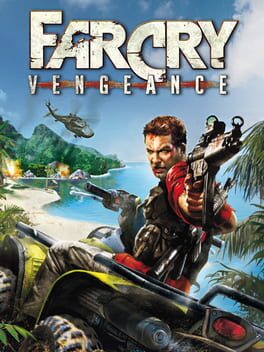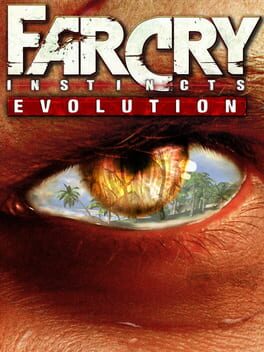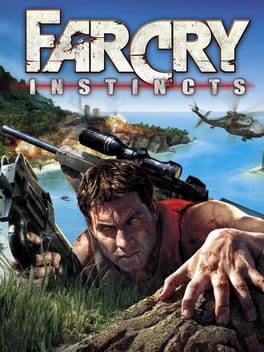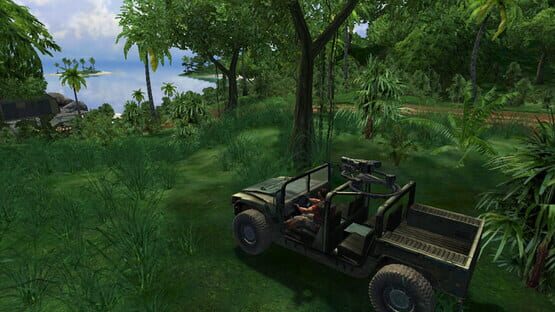

A tropical paradise seethes with hidden evil in Far Cry, a cunningly detailed action shooter that pushed the boundaries of combat to shocking new levels.Freelance mariner Jack Carver is cursing the day he ever came to this island. A week ago, a brash female reporter named Valerie had offered him an incredible sum of cash to take her to this unspoiled paradise. Shortly after docking, however, Jack's boat was greeted by artillery fire from a mysterious militia group swarming about the island. With his boat destroyed, his money gone, and the gorgeous Valerie suddenly missing, Jack now finds himself facing an army of mercenaries amidst the wilds of the island, with nothing but a gun and his wits to survive. But the further he pushes into the lush jungle canopy, the stranger things become. Jack encounters an insider within the militia group who reveals the horrific details of the mercenaries' true intentions. He presents Jack with an unsettling choice: battle the deadliest mercenaries, or condemn the human race to a maniac's insidious agenda.
Also in series
Reviews View More
Le jeu a 20 ans, donc forcement il a vieilli sous tous ses aspect, mais le jeu reste sympa à jouer !
L'intelligence artificielle est vraiment bancale par contre, à moins qu'il s'agisse d'un bug sur ma version, dîtes adieu à l'infiltration, c'est juste impossible.
Graphiquement il devait vraiment être pas mal pour l'époque, et même encore aujourd'hui certains panoramas sont "beau" à regarder.
Bref, pour 2€ vous avez de quoi vous amuser 4-5€ si c'est votre genre de jeu !
Uma das maiores realizações de Far Cry foi sua tecnologia revolucionária na época do lançamento. O jogo apresentava gráficos impressionantes e vastos ambientes abertos para explorar, algo que era incomum na época. Além disso, a inteligência artificial dos inimigos foi elogiada por sua sofisticação e adaptabilidade, proporcionando desafios dinâmicos para os jogadores.
No entanto, apesar de seus avanços técnicos, Far Cry enfrentou críticas em outras áreas. Alguns jogadores consideraram a história e os personagens rasos, com pouca profundidade e desenvolvimento. Além disso, o ritmo do jogo às vezes era irregular, com momentos de ação intensa intercalados com períodos de tédio durante a exploração dos vastos ambientes.
Além disso, Far Cry foi criticado por sua dificuldade ocasionalmente frustrante, especialmente em níveis mais avançados, onde os jogadores podiam ser sobrecarregados por inimigos e situações desfavoráveis. Isso pode ter afastado alguns jogadores e limitado a acessibilidade do jogo para uma audiência mais ampla.
Apesar dessas críticas, Far Cry ainda é lembrado como um jogo importante na história dos jogos de tiro em primeira pessoa, introduzindo novas ideias e conceitos que influenciaram muitos jogos subsequentes no gênero. Portanto, uma nota de 6/10 reconhece suas realizações significativas, mas também leva em consideração suas falhas e limitações em comparação com os padrões contemporâneos do gênero.
(Contains spoilers for the ending, but you probably shouldn’t care).
Far Cry... a franchise looked down upon in today’s current gaming landscape for its ongoing repetitiveness and obstinate nature—for its outright hellbent refusal to evolve and grow into something that isn’t a blatant map-marker simulator. I was curious to see what Crytek cooked up with this first entry before it became the thing to hate, and if you’ve never played this one—you might be asking the question of how it compares to its successors and whether it contains any of the aforementioned stuff? Well, not quite. But it certainly has its fair share of issues—to say the least—unrelated to Ubisoft’s modern spin on the franchise that I think are worth talking about. And yeah, you read that right… Crytek developed this first game—not Ubisoft (although they did help in publishing); which means it’s relatively free from their common open world trappings. No longer does it take the form of a sprawling sandbox FPS with RPG elements; but rather a linear (despite the lead producer saying otherwise) FPS with a level-based structure akin to something like Call of Duty but slightly more varied in its gameplay design. (Side note: I’m judging Far Cry as if it was made today, because I don’t like experiencing games through an “objective” lens nor would that review be anywhere near accurate to my true feelings—and thus I would feel like a fraud for endorsing a game because it was revolutionary for a time).
Firstly, can I take a moment to gush about the cover for this? It’s so irrefutably iconic. A bloody Jack Carver emerging from a clear-as-day river set on a tropical island of sorts wearing that vibrantly ruby Hawaiian shirt with a massive gun sticking out the water with explosions—well, exploding in the background? Sorry for my language, but it’s peak. There’s nothing like it, although I’ve always associated this pure display of testosterone with the third game… for whatever reason those two are linked in my mind, perhaps it’s the similarity in location? I think I may be experiencing the single-person version of the Mandela effect, either that or I’m a complete idiot (the latter is far more likely). I wish this at all contributed to my score of the game, but alas—it does not. I wish I liked the game as much as I fucking adore its poster. But you’ll see throughout this review that it’s the only thing I’ll ever be caught singing its praises for (besides the visuals)—because I’m sure as shit the game isn’t worth any of that.
What do you think of when I mention… “Far Cry”? Is it the facade of a living, breathing open world? Is it the bombastic or often stealthy ”do what you want—how you want” nature of its gameplay that gives the player plenty of options to utilize? Maybe it’s the memorably spine-chilling, meticulously crafted villains? It could even be the very tainted name of Ubisoft itself? Either way, you will find exactly zero of those characteristics here. Never have I seen a franchise so detached from where it eventually winds up, except maybe with Assassin’s Creed—funnily enough that’s also another IP that has become synonymous with Ubisoft’s mishandling of franchises, but I digress—that’s a topic for another review (maybe an Assassin’s Creed Valhalla one (eventually 👀). Although with having said that—you’d probably expect to find absolutely no semblance of its later identity here… right? Well no, the two separate entities actually share quite a few similarities, even if most of them are comprised of half-baked ideas that only really blossom into their full potential later down the line. Some of these staple Far Cry systems are widely known as: the glider, binoculars, stealth—and in turn the machete, enemy patrols, and first person driving (surprisingly similar to modern Far Cry’s); in many ways it’s a completely different beast… but in some you can still see that untapped formula waiting to get exploited into oblivion. And so it walks—or should I say falls face flat—into one end of a line that consists of systems being underdeveloped vs overtly “perfected”, I’ll let you take a guess on which end it lies. This shouldn’t come as a shock—I mean of course these systems are inferior, what did I really expect going into a 2004 game? Definitely not the visuals. It might be a hot take to say that Far Cry is the most stunning game to come out during its release and a few years after—at least from a fidelity outlook. You can almost feel its warm breeze flow through its densely foliaged jungles—of which there are many; saturated colors of emerald-greens and sky-blues directly contrasted against the fallen blood of your foes. It’s that distinction between the two that I find so captivating; it’s paradise… yet you’re faced with the worst of what the world has to offer: genetically mutated monstrosities. I’ve always been curious about why that is, why this franchise decides to choose these remote locales that strip away your connection to the outside world. I know the answer for the latest entries is to give the player that sense of isolation—to drop them into danger incarnate and ask them to survive and adapt at their very basic instinctual level; to go from being the hunted to the hunter, albeit with a few modern twists via guns and explosions. But why did they decide to go with a tropical island here? Well I would’ve hoped for something as thematically potent as what I just described… but no it was because an outdoor environment had never been done well before (I’ll be referencing this interview throughout the rest of my review since it’s the only one I could find). This was disappointing to hear for a multitude of reasons. For one it makes Far Cry seem like a tech demo—granted it was one at the time, but for modern day audiences this will do nothing to make them engaged because its priorities were presentation over everything else. Themes are a central part of experiencing art and can make an otherwise boring game worthwhile, where Far Cry falters is that it has no messages apart from a senseless commentary on privatized science and genetic engineering? But these elements are given the weight of a feather and hardly seem intentional—more like a by-product of the story.
An ex-military soldier (Jack Carver) has washed ashore a tropical island—or an archipelago if you want to be accurate—after getting his boat blasted with missiles by paid mercenaries. Our objective you ask? Well it changes from scene to scene… but at the beginning? To find Valerie Constantine; the journalist Jack Carver was with before everything went to shit. And so the nightmare begins (for me, literally and figuratively). The opening cinematic this game opens up with is a mess. An unbridled, disjointed, awful mess. I recognize this could be the point… it very well could be! Oh those pesky predictable ambushes!! You hate when those happen, right!? Those never happen. Obviously it’s meant to be unexpected to all, but that scene being paced at 2x speed while events happen in reverse—and then back to normal order… was certainly a choice. I don’t think anyone would quite understand it on their first try unless they were paying godly amounts of attention; I had to rewatch it after the fact to even understand what was happening (might be a skill issue). It exemplifies that classic “BOOM POW BANG” structure that every game from the fifth/sixth console generation was dipping their toes into. It was all about “Action! Action! Action!” no substance—maybe some if there was enough room! You gotta hook those players in, man! Well of course; shooting, explosions, carnage, destruction, parkour, it’s all there! Did it hook me in? Nope. From that point on I knew exactly what type of game this was. One of nonsensical narrative. If we’re to look at the story as a whole… it’s clear that events happen for the sake of the thrill & moving the plot forward; one thing is resolved, another is introduced—literally from moment to moment. And bad pacing is the product of this; to the point where ¼ onwards feels like the third act. Just continuously action-oriented, and nothing else. I understand that resolving and introducing plot points is sort of the way narratives work… I’m not an idiot, but its hasty nature makes it hard to pinpoint exactly where you are in the story, and so the result is fatigue... from experiencing the excessive dumping of monotonous objectives. Some of you might say… “It’s an action game! That’s the point”. Well, sure. But what about variety? I can’t find the fun in shooting a bunch of samey—annoying enemies for the 300th time while going from room to room in a dull laboratory. And I know what Christopher Natsuume (the lead producer) said when he was asked “Does that mean that there will be none or only few in-doors environments?”. Supposedly the majority of the game is set outside, and he’s not lying—that’s true, but I counted up how much time the player spends indoors vs outdoors; and the gap isn’t as huge as he probably wanted you to believe at the time. You spend roughly 35-40% of your playtime indoors shuffling through dark and drab corridors; going from an underground section to another old-boring warehouse. His answer about players not wanting “to stay indoors the whole time” in a game set on a tropical island is very true! I don’t. So why did he make me do that for a huge chunk of the game? For variety and contrast he says! My counterpoint: There’s already enough variety with the numerous jungles that are present here. Like—I love the beginning location of this game! It’s so vibrant—with life galore, birds in the sky—chirping, fish in the waters, sunrays beaming through copious amounts of thick leaves. The affectivity this game possesses is bewildering… in the opening hour that is. But then… you’re going in and out of open/enclosed spaces every 10 minutes and it gets tiring. And that’s before it devolves into monster slop. I’m not trying to say “ban indoor environments”, they’re fine in sparsity for this type of setting, but 40% of the game? That’s way too much. I've started to notice how obsessed the 5-7th console generations were with adding monsters/genetically mutated humans in their narratives as plot devices, or is that only me? Either way, from the second quarter onwards it becomes completely unrecognizable from the franchise’s later entries. Trigens are introduced as a lazy attempt at enemy variety… and the game instantly plummets. It was clearly chasing the trend of wanting to be a pulpy blockbuster B-movie. No real artistic value (in my opinion). No subtlety. Predictability and all. It’s almost comically unreal how expected everything is. Like of course we have to add a betrayal in there! And an entire fucking nuke at the end! How else could Far Cry possibly conclude its story—after one-upping its ridiculousness scene after scene (in a bad way)?
“Your ass is grass!”
Luckily we have a protagonist that matches that energy. Protagonists have never been Far Cry’s strong suit, besides Jason and Ajay I’d argue—but even then they’re severely complimented by their respective villains (less so Jason, but you get the point). And you know that common complaint thrown at the protagonists in those two games—how them handling guns, blowing up and killing people right-left-and-center makes no sense? Well that’s not really an issue here. Like I mentioned before—Jack Carver is an ex-military soldier. But that’s almost a double-edged sword. It completely omits him from an interesting arc! The satisfying thing about Jason was that he was virtually a frat boy who went from being an entitled brat to an overwhelming force of nature; he was badass, confident, and a compulsive killing machine. It allowed for attachment and at least a little bit of intrigue. With Jack it’s more like you’re living through him, projecting yourself onto him because he’s such a blank slate and devoid of any defining characteristics—besides his whole macho ordeal. I did enjoy his wacky, hammed-up personality at the beginning, even if the acting was… questionable at best, and comically awful at worst. It works for what the game is trying to do but I found myself getting irritated with him near the end—his voice got borderline grating, but I think that was because I was starting to hate what I was playing? It could’ve been that or the fact that Jack started to sound more and more like a whiny toddler. I was convinced he was a schizophrenic in all honesty too, sounds weird—I know, but he talks like a campy 80s action hero despite everyone else speaking fairly normally. He says crazy, out of pocket shit, and I honestly felt like he was exaggerating his sentences for an imaginary audience at every turn. It’s either that or he’s off the walls fucking insane (maybe he misses his glory days???). On the opposite end of “normality” we have Valerie and Doyle. It’s 2004, so I wouldn’t expect much from side characters apart from one-note archetypes charading as to having characteristics. Valerie is a damsel in distress—but simultaneously capable at times? Which is odd. It doesn’t make much sense since she’s a CIA agent. And Doyle is a scientist who speaks in an overtly monotone, disinterested tone, with money being his big motivator by the end. That’s pretty much it. I’m sitting here thinking about those two, and I can’t come up with anything to say. There’s nothing there. Boring stuff! Let’s move on.
So, I think the biggest shock that came to me when I started playing was how military this felt; something the later entries completely abandoned. It seems to me like that’s a product of its time though, since a myriad of games were doing that when this released. I don’t know why this has to be focused on militarism, I find that nobodies arriving or landing on islands/secluded regions are far more compelling to me. But regardless, this aspect is evidently shown through almost every aspect of the game. The score takes a more drum-heavy approach, boasting for marches and… drills—you can almost hear the stocks of guns hitting the ground. Carrier - Combat and Menu-1 seem to be the most glaring examples of this. If the rest of the tracks aren’t more of this, then they’re either very quiet & calm pieces (I’ll explain why later), or jungle themes since Jack is—well, practically lost in countless jungles throughout the game! That’s all I observed about the score since a lot of it is repetitive, generic, and not that exciting. But since this is indeed very militaristic, the combat also compliments that; it takes a semi-realistic approach rather than an arcady one. Guns have proper recoil, their size affects movement speed, you even have a stamina bar… would you believe that? Suffice it to say, I’m not a huge fan. When the game is already a chore to go through, it doesn’t help that I have to carefully observe how much I sprint and jump. It creates tedium and prolongs the game, and I’d say it’s one of those useless game mechanics akin to something like “item weight” in an RPG. What is its purpose? It’s never been done well before, unless it’s at the forefront of an indie game built around movement or something. Shooting is wildly inconsistent too. Headshots are your go to in Far Cry, but some of the hitboxes are placed awkwardly so you’ll sometimes one-shot enemies, and other times have to hit their head multiple times. Anything else—like shots near their higher/lower bodies is entirely redundant. I also encountered a bug that made my sniper scope keep glitching out, so I couldn’t really use that comfortably either. I was rocking the suppressed MP3 for half of my playthrough because it’s easily the best weapon for stealth… which is a bizarre oddity in and of itself.
There’s no point to it. Systems literally don’t work around it. This wouldn’t be an issue if the game didn’t actively encourage it throughout almost every level, but they do (which is why most of the tracks sound that way). So there’s a couple parts to this. One, there are only two silent weapons—those being, the previously mentioned MP3, and the machete; but the thing is, the MP3 isn’t introduced until later in the game and the machete doesn’t kill enemies in a single hit (even from behind), meaning… they’ll detect you in an instant if you attempt a kill which will then alert your position to the other enemies. The second part is that the baseline of your presence in this game is undetected, that is huge; whereas in your typical Call of Duty game, it’s detected. So the funny thing is, Far Cry presents you levels with particular objectives that are stealth oriented, but on contrary places AI in those levels that detect you in an instant—that you can’t kill stealthily, all while developing no systems whatsoever that actually allow you to maintain that baseline. There is no way for you to complete these levels stealthily—at least early on, it’s simply not possible. It’s a weird aspect of this game that I feel wasn’t even thought about during its development? Since characters will react disappointedly to getting detected in a level… but, what does it want me to do? It’s peculiar. I don’t think I’ve ever seen a game that wants you to be stealthy, but doesn’t actually create systems to make that possible. I’m baffled by this, seriously. I don’t get it. This is a huge reason why I dislike this game so passionately. It’s not fun because there’s only so many ways you can go through a level causing destruction and carnage.
Some of these levels are beyond confusing too. It’s something older games used to do for the sake of it I guess? It’s not at all clear where you’re supposed to go at times, since the minimap glitches out; but it’s also because the levels are laid out in a convoluted way. One example comes to mind, it’s when you’re driving through a series of very small islands separated by rivers made up of lava. You’re supposed to reach an area by jumping over several hills with your vehicle, but there’s many curves, many ground imperfections, you can’t see anything, so you’ll randomly drive into lava and die—which results in trial and error gameplay. It’s incredibly frustrating.
Just all in all not a fun time. I hope this franchise starts to pick up with the second game (since I’m playing through the entire series). It’s probably the one I know the least about? So that should be interesting.
(This isn’t a part of the review). I’ve been so busy recently I haven’t had a chance to write more of these, which is a big shame… I had a lot of fun with this one though. Not my best work but this game fucking sucks balls, man. Next one should be on Uncharted 3.
Playtime: 8.9 hours
Every Game I’ve Ever Played - Ranked (By Score)
Ubisoft - Ranked
Far Cry - Ranked
2004 - Ranked
